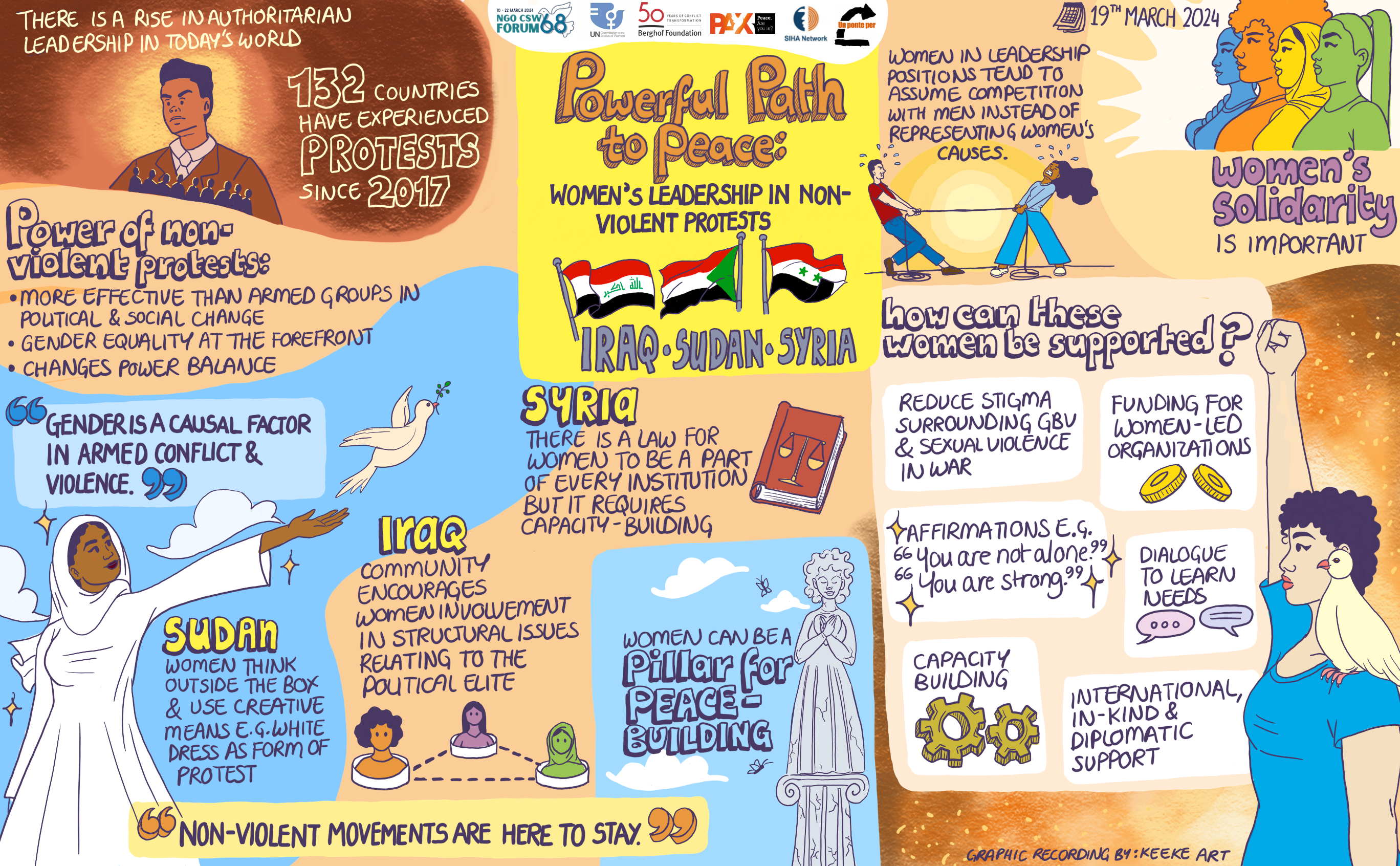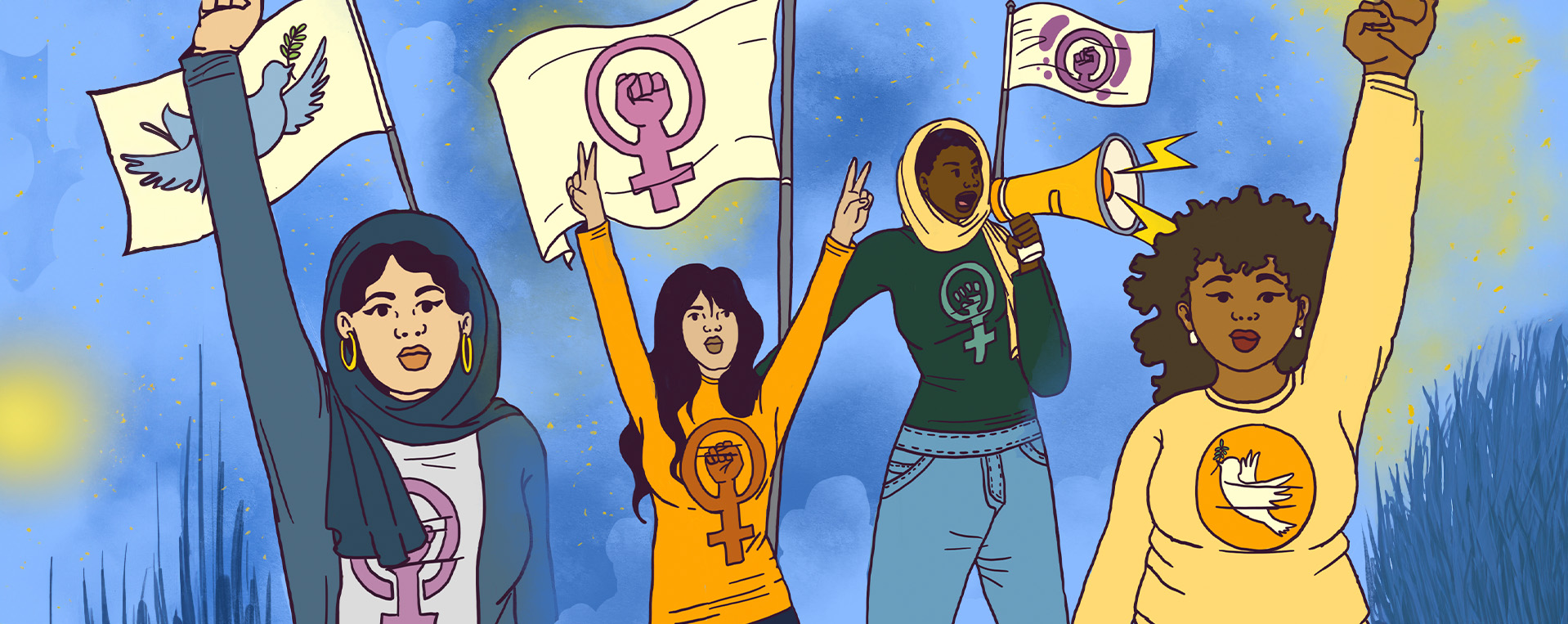Non-violent movements are effective agents of political and social change. The greater participation of women and their leadership in such movements results in the maintenance of non-violent discipline, greater success and the achievement of more gender inclusive results. It is therefore crucial to support women’s involvement and leadership in non-violent movements as part of supporting women’s political and social participation in peace building and processes.
On the 19th of March, Berghof, SIHA, UPP, and PAX organized an official virtual parallel event as part of the 68th session of the Commission of the Status of Women. Three leading feminist peace activists and distinguished researchers from Syria, Sudan, and Iraq offered their insights on women’s inclusion in non-violent movements, the role of external actors in supporting women’s leadership and insider mediation in these settings.
Women’s impact on non-violent movements
Zahra Hayder, a leading Sudanese activist, opened the floor by explaining how women played a significant role in the Sudanese revolution that started in 2018 which overthrew dictator Al-Bashir’s oppressive regime. Women’s creativity, coordination and leadership proved crucial, offering non-violent alternatives capable of reaching communities more effectively and peacefully. Their participation in the revolution led to the redefinition of women’s role in society and a break of women’s confinement to the private sphere.
An Iraqi women’s rights activist subsequently outlined the revolutionary participation, leadership roles and contributions of women in the 2019 Tishreen movement. Due to women’s insider mediation role, protests became more secure and peaceful, as the women were able to build bridges between security forces and protesters through dialogue. Moreover, women were crucial in the reformulation of the election law and the inclusion of women in political leadership roles. The Syrian civil activist explained how women against dominant gender norms participated in great numbers and became influential during of 2011-12 Syrian Revolution 2023 Syrian Protests, because of their non-violent approaches that allowed them to be in contact with de-facto forces, women became “tools for peace.” Their influence extended to the political sphere, as a quota of 50% initially enabled women’s political participation in northeast Syria.

Contextual realities and opportunities
Although women’s participation in protest movements yielded positive results, as evidenced with the maintenance of non-violent approaches and the greater inclusion of women in social and political areas, due to severe contextual changes women across Syria, Sudan and Iraq have since faced many challenges that hinder the full realization of their rights. Nonetheless, women’s organisations and networks of activists continue to persevere. Zahra stated that due to patriarchal mindsets, women’s leadership roles in the Sudanese demonstrations did not translate to leading roles in decision-making after the revolution. In the context of Iraq, structural issues regarding the economic discrimination of women and the influence of political elites in the country continue to jeopardize women’s security, stability and safety. This is especially compounded by the growing backlash against women’s rights and the official crackdown on the notion of gender. In Syria, the parity quota did not translate into equal political representation, as women were not enabled to take on leadership positions. Therefore, the Syrian activist stressed the need to develop women’s skills through capacity-building and trainings. A common point in the activists’ reflection was the demand for support from the international community to overcome these challenges.
International role and support
To all panelists the role of the international community was seen as essential to strengthen women’s political and social participation. To achieve this, international actors were encouraged to support women through capacity-building, training, economic empowerment, and diplomatic support. Negotiations and decision-making at the international and national level must actively involve women to ensure their meaningful representation. To address structural issues and support women’s political leadership, the feminist peace activists from Syria, Sudan, and Iraq outlined four key strategies. First, the international community should play a harmonizing role. This entails the development of laws, guidelines, policies, and institutions that protect, raise awareness and support women, in particular survivors of sexual- and gender-based violence. Second, global actors must ensure the safety and security of women occupying political positions during periods of political instability. Third, resources must be allocated to support women-led organisations in particular. Finally, it is fundamental that international actors facilitate inclusive dialogues so that women’s voices are heard, and their specific needs are considered.
Canadian Diplomat and Director of Peace Programming, Pamela Moore, added in her concluding speech that the role of women in peacebuilding requires consistent protection and financial, political, and diplomatic support, and structural support to women’s organisations and feminist movements globally.
After a lively Q&A discussion with the audience, all participants agreed that women solidarity across diverse backgrounds and countries is particularly relevant to offer support, exchange knowledge and overcome the challenges faced by women so that their collaborative roles in non-violent movements and in international politics become more effective.






